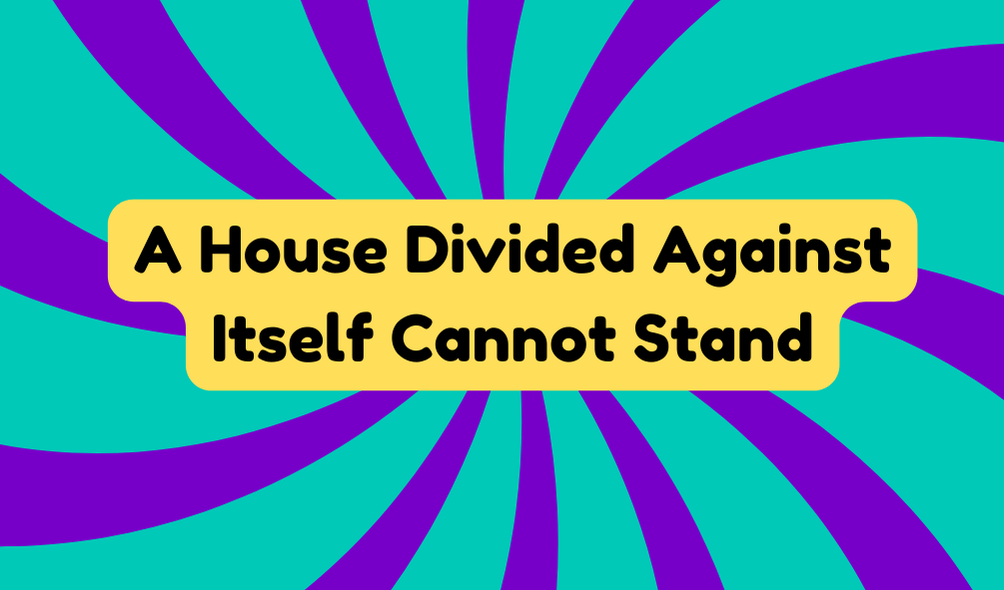The phrase "A house divided against itself cannot stand" highlights the dangers of division and the necessity of unity. It suggests that without collaboration and mutual support, groups or nations may face collapse. This idea, rooted in historical contexts like Lincoln's speeches on slavery, still holds relevance today. A lack of unity can hinder progress and problem-solving. Understanding this concept can promote teamwork and address conflict, paving the way for more effective societies and organizations. More insights await.
Synonyms
In discussions about collaboration and unity, synonyms such as "togetherness," "solidarity," and "cohesion" often emerge. These terms create positive imagery but mask the complexities of real-world application, especially in unity strategies and conflict resolution. Achieving true collaboration requires deeper understanding beyond mere words. Consider the following:
- Interdependence fosters cooperative behaviors.
- Harmony enables efficient problem-solving.
- Teamwork encourages shared responsibility.
- Inclusion promotes diverse perspectives.
- Partnership strengthens collective resilience.
While these synonyms convey an ideal, they may overlook underlying issues. A superficial embrace of these concepts can lead to superficial solutions, undermining genuine progress and unity in critical situations.
Example of Sentences
Examples of sentences illustrating the phrase "A house divided cannot stand" underscore the importance of unity in various contexts. These examples reveal how a lack of collaboration can lead to failure, emphasizing the unity importance in effective teamwork. Consider these scenarios:
- Workers need a union due to division issues.
- Aggrieved parties will sue collectively for strength.
- Visiting the principal collectively demonstrates unity.
- Adventure sports rely on teamwork; division hampers safety.
- Unified efforts lead to better solutions in conflicts.
In each case, the collaboration benefits are evident, showcasing that division breeds disintegration, ultimately undermining success.
Origin
The phrase "A house divided cannot stand" has its roots in a pivotal moment in American history, attributed to Abraham Lincoln's speech during the Lincoln-Douglas debates of 1858. In this historical context, Lincoln grappled with the political implications of a nation torn apart by slavery and differing ideologies. His assertion emphasized the necessity of unity for governance and social stability. While Lincoln's usage gained popularity, it also highlighted the fractures within society. This phrase resonates beyond its initial setting, serving as a cautionary reminder that division can ultimately lead to disintegration, rendering collaborative efforts futile and undermining progress.
Collocations
Understanding collocations associated with the phrase "A house divided cannot stand" sheds light on how language reflects society's realities. These collocations showcase the importance of unity and often highlight divisions that can lead to failure. Some notable collocation examples include:
- "stand together"
- "common ground"
- "work collectively"
- "support each other"
- "engage in conflict"
The collocation significance extends beyond mere language; it reveals deeper insights into collaborative dynamics. Recognizing these combinations underscores the essential need for harmony within organizations, serving as a reminder that unresolved differences can threaten overall success in both personal and professional domains.
How to Use in Everyday Language
Unity plays a crucial role in daily interactions, and recognizing this can help individuals navigate various social environments. In professional settings, phrases like "team cohesion" highlight the importance of collaboration to achieve shared goals. When conflicts arise, employing strategies for conflict resolution demonstrates a commitment to maintaining harmony. It's imperative to understand that divisions can destabilize teams and hinder progress. By actively fostering unity through clear communication and supportive actions, individuals can contribute to a more cohesive atmosphere. Acknowledging the significance of staying united allows for innovative problem-solving and potentially superior outcomes in both personal and professional contexts.
Why Is It Still Relevant Today?
In today's world, a divided society can lead to significant challenges that affect various aspects of life, from politics to community relationships. Divisive politics create polarization, hindering collaborative efforts essential for progress. Unity strategies, designed to bridge gaps and foster cooperation, are more important than ever. Without these strategies, organizations struggle to thrive, as disunity paralyzes decision-making and innovation. Furthermore, the lack of cohesion in communities can result in increased tension and conflict. Acknowledging this relevance encourages individuals to seek common ground and prioritize collective solutions, allowing society to effectively navigate the complexities of modern challenges and foster sustainable growth.







